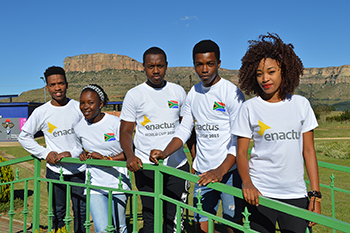Latest News Archive
Please select Category, Year, and then Month to display items
02 January 2025
|
Story Gerda-Marie van Rooyen
|
Photo Supplied
 Leading the research in South Africa is Prof Linus Franke from the Department of Soil, Crop and Climate Sciences.
Leading the research in South Africa is Prof Linus Franke from the Department of Soil, Crop and Climate Sciences.
Scientists are actively pursuing the successful breeding of diploid hybrid potatoes from inbred lines. This is expected to revolutionise potato breeding as it holds the key to rapid genetic progress. It will introduce new varieties for commercialisation through seed. Currently, existing potato variants have a gene that renders self-pollinated seeds infertile.
Prof Linus Franke, an academic in the Department of Soil, Crop and Climate Sciences at the UFS, is leading the research in South Africa. “This technology allows the production of genetically uniform potato seed that is easy to transport and largely disease-free.” He says this differs from conventional breeding whereby only vegetative propagation is possible due to tetraploid varieties in potatoes. It also risks carrying pests and diseases from one generation to the next – leading to the accumulation of pests and diseases with each round of multiplication.
Seed innovation
Prof Franke explains that Solynta BV, a seed company based in the Netherlands that produces potato varieties that can be grown from seed, has included South Africa in their research efforts because it is one of Africa’s largest producers and exporters. Through his academic relationship with Wageningen University and Research, a Dutch institution renowned for its agricultural endeavours and food production, the UFS became involved in researching hybrid potatoes grown from seed.
Diploid seeds containing two sets of chromosomes allow easier gene manipulation to increase predictability and speedier genetic progress. The breeding approach enables the incorporation of tolerance to pests, diseases, abiotic stresses (cold, heat, drought) and other desired genetic traits.
Although Prof Franke is optimistic about this research, he is not blind to disadvantages. “Potato seeds are tiny and have little energy reserves, making it harder to grow potatoes from seed than from tubers.” He says potatoes from seed will take longer to cultivate than tubers, as farmers need to grow plantlets from seeds first, adding six weeks to the growing period. “It is possible that commercial farmers can grow potatoes directly from seed. Alternatively, perhaps more likely, specialised growers will produce tubers of potatoes from seed; these tubers are then sold as seed tubers to other potato farmers, who then continue their normal practices of producing potatoes for the market from tubers.”
Financial benefits
Prof Franke says farmers have reason to get excited. “Seed potatoes will reduce input costs, as varieties with enhanced tolerance to pests and diseases require less pesticides. Planting one hectare of potatoes requires three to four tonnes of potato tubers, but only one 25 g packet of potato seeds.” Since potatoes are a more valuable commodity than maize, this technology might also increase farmers’ income potential.
Enactus heeds call to be of service to its communities
2017-01-17

The newly-elected vice president of Enactus
University of the Free State, Solomuzi Khati
(third from left) with members of Enactus on
the Qwaqwa Campus.
Photo: Thabo Kessah
The future of South Africa is in good hands if Enactus activities are anything to go by. Enactus is an international non-profit organisation bringing together student, academic and business leaders committed to using entrepreneurial action to improve lives. And the Qwaqwa Campus chapter is doing exactly that – changing lives.
Community engagement
This team of enthusiastic and energetic students have touched the Qwaqwa community in more ways than one through their community engagement activities. One such activity was when they adopted the Team Spirit Centre as their partner for development and empowerment.
“Up to now, the chapter has lived up to its purpose of assisting and uplifting the Qwaqwa community. As part of our programme, we identified a problem that we are currently helping to solve,” said Solomuzi Khati, the newly-elected vice president of Enactus University of the Free State.
Skills development
“We have realised that many centres housing orphaned and vulnerable children, like the Team Spirit in Makoane in Qwaqwa, are not sustainable. Our project introduced a business concept to the centre where we helped to plant vegetables so the owner Mrs Manthabeleng could then use and sell at a later stage,” he said. “In the process, students and Mrs Manthabeleng would develop various entrepreneurial, finance and business skills for future use on top of the centre generating income to sustain itself,” he added.
Appointment of Advisory Board
Khati also revealed Enactus was in the process of inviting business and community leaders into their Business Advisory Board. “This is a group of business people who are recruited to serve as mentors for our team. Typically, a Business Advisory Board is composed of 10-50 business leaders in the community. Board members can keep students informed of current business concerns and trends, provide financial or in-kind assistance for projects, critique annual reports and presentations, and provide networking opportunities.”